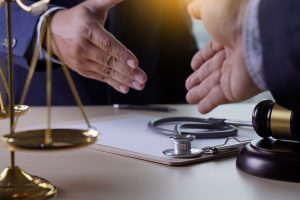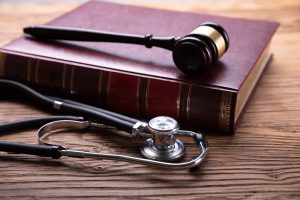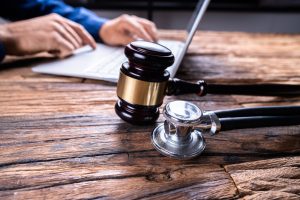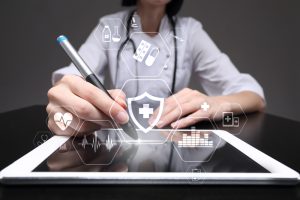Legal nursing plays a pivotal role in maintaining high standards of care within healthcare settings. This specialized field intersects with legal expertise to ensure that patient care adheres to established protocols and regulations. The critical responsibilities of legal nurses include interpreting and applying healthcare laws, advocating for patient safety, and contributing to legal proceedings related to healthcare. Understanding the role of legal nursing is essential to uphold the standard of care and to facilitate continuous improvement in healthcare practices.

AIHCP offers a certification in Legal Nursing that can help train nurses in the necessary knowledge and skills to successfully become Legal Nurses as well as Forensic Nurses.
Key Takeaways
- Legal nursing is vital for interpreting healthcare laws and ensuring patient care complies with legal standards.
- Forensic nurses bridge the gap between patient care and legal expertise, playing a crucial role in legal proceedings.
- Litigation can drive improvements in nursing home standards, acting as both a corrective mechanism and a deterrent.
- Professional accountability in nursing is crucial for ethical and legal adherence, impacting patient safety and care quality.
- Collaborative efforts between legal and medical professionals are essential for enhancing patient care and upholding standards.
The Intersection of Legal Nursing and Standard of Care
Defining Legal Nursing within the Healthcare Context
Legal nursing is an essential bridge between the healthcare system and the judicial arena, where the specialized knowledge of nurses is applied to legal cases and issues. Legal nurses play a pivotal role in interpreting and communicating medical information to legal entities, ensuring that the nuances of patient care are accurately represented in legal proceedings.
- Legal nurses are often involved in case reviews, offering expert testimony, and consulting on healthcare-related legal matters.
- Their expertise is crucial in translating medical jargon into understandable language for the legal system.
- They may also assist in preparing medical records for court cases, ensuring that documentation is thorough and complies with legal standards.
Legal nursing requires a deep understanding of both medical practices and legal principles, enabling nurses to navigate the complexities of healthcare litigation effectively.
The demand for legal nursing expertise is reflected in the various certifications available, such as Legal Nurse Consulting and Forensic Nursing. These certifications underscore the specialized nature of the field and the importance of a comprehensive legal and medical skill set.
Exploring the Relationship between Legal Nursing and Patient Safety
The integration of legal nursing into healthcare systems is pivotal for enhancing patient safety. Legal nurses play a crucial role in interpreting and applying healthcare laws and regulations to clinical practice, ensuring that patient care is not only effective but also compliant with legal standards. Legal nursing serves as a safeguard against malpractice and negligence, by bridging the gap between medical care and legal requirements.
- Legal nurses analyze patient care from a legal perspective, identifying potential risks and advising on preventive measures.
- They contribute to the development and implementation of policies and procedures that protect patient rights and promote safety.
- Legal nurses are instrumental in educating healthcare staff on legal aspects of patient care, fostering a culture of compliance and accountability.
Legal nursing’s contribution to patient safety is not merely about compliance; it’s about embedding a legal consciousness within the fabric of healthcare delivery. This ensures that patient care decisions are made with a thorough understanding of legal implications, thereby minimizing the risk of harm and enhancing overall patient well-being.
Assessing the Impact of Legal Nursing on Standard of Care Compliance
The integration of legal nursing into healthcare systems has been pivotal in reinforcing the standard of care compliance. Legal nurses serve as crucial agents in translating legal outcomes into actionable healthcare improvements. Their expertise in both medical and legal realms enables them to identify areas where care may fall short of regulatory requirements and to advocate for necessary changes.
- Enhanced staff training and increased staffing levels
- Installation of better safety equipment and monitoring systems
- Revised policies prioritizing resident care and quality of life
These improvements are often the result of legal actions that have highlighted deficiencies in care. Legal nursing professionals play a key role in ensuring that the lessons learned from litigation translate into lasting reforms within healthcare facilities.
The proactive involvement of legal nurses in monitoring compliance and implementing best practices has shown to be effective in mitigating risks and elevating the quality of patient care.
As legal nursing continues to evolve, its impact on standard of care compliance is increasingly recognized as a cornerstone of patient safety and quality healthcare delivery.
Forensic Nursing: Bridging Patient Care and Legal Expertise
The Role of Forensic Nurses in Legal Proceedings
Forensic nurses serve as vital links between the realms of healthcare and the judicial system. Their expertise is not only essential in providing specialized care to patients who have experienced trauma but also in the meticulous collection and preservation of evidence crucial for legal scrutiny. Forensic nurses are uniquely positioned to ensure that the evidence collected during medical examinations is admissible in court, thereby playing a pivotal role in the administration of justice. Please also review AIHCP’s Forensic Nursing Program
- They are trained to document injuries and collect DNA samples, photographs, and medical records with precision.
- Their testimony as expert witnesses can elucidate the nature of injuries and the treatment provided, influencing legal outcomes.
- Collaboration with law enforcement is key, as it facilitates a comprehensive approach to patient care and criminal investigation.
The dual responsibilities of forensic nurses underscore the importance of their role in upholding both patient welfare and legal integrity. Their contributions are indispensable in ensuring that legal proceedings are informed by accurate and reliable medical evidence.
Navigating Jurisdictional Laws in Clinical Practice
Forensic nurses operate at the intersection of healthcare and the legal system, where understanding and adhering to jurisdictional laws is paramount. Their expertise is critical in ensuring that the care provided to patients, particularly in sensitive cases such as sexual assault, is legally defensible.
- Understanding the jurisdictional laws and regulations
- Adhering to strict legal guidelines during examinations
- Preparing clear and concise documentation for legal proceedings
Forensic nurses must be well-versed in the legal standards, regulations, and ethics of nursing and healthcare. This legal knowledge is essential not only for providing high-quality care but also for serving as expert witnesses in legal proceedings.
Our meticulous attention to legal details not only upholds the integrity of the judicial process but also reinforces the trust placed in us by the survivors and the community.
Staying informed about changes in legislation and judicial precedents is a continuous commitment for forensic nurses. This dedication to legal literacy ensures that patient care is aligned with the latest legal requirements, thereby safeguarding patient rights within the legal system.
Ensuring Legally Defensible Actions in Patient Care
In the realm of legal nursing, ensuring that patient care actions are legally defensible is paramount. Forensic nurses must operate within the bounds of jurisdictional laws, maintaining a high standard of practice that can withstand legal scrutiny. This involves a meticulous approach to clinical procedures and documentation, which serves as the backbone of legal defense in healthcare.
- Understanding the jurisdictional laws and regulations
- Adhering to strict legal guidelines during examinations
- Preparing clear and concise documentation for legal proceedings
The integrity of patient care is not only a matter of ethical and professional responsibility but also a legal imperative. Actions taken by healthcare professionals must be justifiable under the law to protect both the patient and the institution.
The following table outlines key aspects of legally defensible actions in patient care:
| Aspect | Description |
|---|---|
| Informed Consent | Ensuring patients are fully aware and agree to the treatments and procedures. |
| Ethical Standards | Adhering to principles such as beneficence, non-maleficence, autonomy, and justice. |
| Documentation | Maintaining accurate and thorough records of patient care and interactions. |
| Continuing Education | Keeping up-to-date with legal and clinical guidelines to prevent malpractice. |
By focusing on these areas, legal nursing professionals can safeguard the standard of care and uphold the legal and ethical obligations inherent in their role.
Litigation as a Catalyst for Nursing Home Standards Improvement
Examining the Role of Litigation in Enforcing Compliance
Litigation plays a pivotal role in the enforcement of compliance within nursing homes. It serves as a critical mechanism for holding facilities accountable and ensuring adherence to established standards of care. Through legal action, courts can mandate corrective measures and award damages, which act as a powerful deterrent against non-compliance.
Litigation is not solely a punitive measure; it is a transformative tool that can lead to systemic improvements in long-term care facilities. By compelling the implementation of new policies and procedures, litigation benefits not only the plaintiffs but also enhances the quality of care for all residents.
The following table illustrates examples of outcomes from litigation that enforced compliance in nursing homes:
| Case | Outcome | Impact on Compliance |
|---|---|---|
| A | Policy revision and staff retraining | Strengthened adherence to care standards |
| B | Installation of new safety equipment | Enhanced resident safety protocols |
| C | Financial penalties and oversight | Increased vigilance and regulatory compliance |
These cases exemplify how legal proceedings can result in tangible improvements, reinforcing the necessity for rigorous compliance with nursing home regulations.
Case Studies: Legal Outcomes Driving Nursing Home Reforms
The legal system has proven to be a formidable force in catalyzing reforms within nursing homes. Through litigation, nursing homes are held accountable, leading to the implementation of critical changes that enhance the quality of care for residents. These case studies serve as a testament to the power of legal outcomes in driving compliance and ensuring the safety and dignity of the elderly.
- Enhanced staff training and increased staffing levels
- Installation of better safety equipment and monitoring systems
- Revision of policies to prioritize resident care and quality of life
Each legal victory not only represents justice for the affected parties but also marks an improvement in the standard of care for all residents. The ripple effect of these outcomes is a testament to the importance of upholding stringent standards in nursing homes.
The impact of these legal interventions is profound, often resulting in systemic changes that benefit current and future residents. It is a clear indication that when legal nursing and standard care compliance intersect, the result is a tangible improvement in the lives of those in long-term care facilities.
The Future Outlook on Nursing Home Regulation Compliance
The trajectory of nursing home regulation compliance is poised for transformation. Ambitiously, we envision a future where compliance is integral to the ethos of every nursing home, ensuring top-tier care for all residents. This vision is underpinned by a commitment to advocating for stronger regulations, improved monitoring, and a culture that prioritizes care.
The role of litigation in this domain cannot be overstated. It serves as both a corrective mechanism and a deterrent, compelling nursing homes to elevate their standards and practices. Through legal actions, we seek not only redress for past wrongs but also to forge a path to better care standards.
To achieve this, several steps are crucial:
- Advocating for the implementation of more robust regulations.
- Enhancing the effectiveness of compliance monitoring systems.
- Cultivating a care-first culture within nursing home environments.
These efforts collectively contribute to a future where the dignity and well-being of nursing home residents are at the forefront of care provision.
Professional Accountability in Nursing Practice
Ethical, Legal, and Professional Obligations of Nurses
Nurses are bound by a triad of responsibilities that are ethical, legal, and professional in nature. Professional accountability in nursing encompasses the obligation to uphold these standards in practice, which includes taking responsibility for actions, decisions, and outcomes related to patient care. Adherence to established protocols and guidelines is crucial to ensure patient safety and quality care.

Advanced nursing education plays a pivotal role in fostering professionalism and ethical practice. It equips nurses with the skills to navigate complex ethical dilemmas, ensuring that care is not only effective but also just and compassionate. As role models and advocates, nurses with advanced education uphold high ethical standards, balancing technological advancements, patient rights, and ethical considerations.
When ethical violations occur in healthcare, it is imperative to address them promptly. A significant portion of healthcare professionals encounter ethical dilemmas in their practice, highlighting the need for robust mechanisms to prevent and confront ethical missteps while maintaining personal and professional boundaries.
The following list outlines the core obligations of nurses:
- Adherence to the code of ethics for nurses
- Compliance with legal standards and healthcare regulations
- Engagement in continuous professional development
- Commitment to patient advocacy and rights
- Responsibility for personal actions and clinical decisions
- Dedication to collaborative practice and respectful communication
Case Analysis: Lapses in Professional Accountability
In the realm of nursing, professional accountability is paramount. It is the duty of nurses to act in accordance with ethical, legal, and professional standards. Lapses in professional accountability can have dire consequences for patient safety and care quality.
In a recent case analysis, two nurses, Jim and Lope, exhibited significant lapses in accountability. Nurse Jim neglected to verify the accuracy of medications, while Nurse Lope administered these without proper verification, leading to a medication error. This incident underscores the critical need for vigilance and adherence to protocols in nursing practice.
Accountability in nursing is not limited to individual actions; it extends to the collective responsibility of the healthcare team. Ensuring that each member is competent and diligent in their duties is essential for maintaining high standards of care.
To prevent such lapses, the following steps are recommended:
- Thorough verification of medication details before administration.
- Regular training on the latest protocols and guidelines.
- Effective communication among healthcare team members.
- Documentation of all procedures and any deviations from standard practice.
These measures are crucial for fostering a culture of accountability and safeguarding patient well-being.
The Consequences of Failing to Uphold Nursing Standards
When nursing standards are not upheld, the repercussions extend beyond individual patient outcomes; they can undermine the integrity of the entire healthcare system. The failure to maintain professional accountability can lead to severe consequences for both patients and healthcare providers.
- Substandard care may result in preventable harm, compromising patient quality of life and potentially causing physical and psychological damage.
- Healthcare providers may face legal actions, including lawsuits, which can tarnish reputations and lead to financial penalties.
- Regulatory bodies may impose sanctions, revoke licenses, or mandate corrective actions, affecting career longevity and professional growth.
The ethical, legal, and professional obligations of nurses form the cornerstone of patient safety and quality care. Neglecting these responsibilities not only breaches trust but also exposes the healthcare system to increased risk of litigation and loss of public confidence.
Ensuring compliance with nursing standards is not merely a legal formality; it is a moral imperative that safeguards the well-being of the most vulnerable individuals in our care.
Legal Frameworks Governing Nursing Homes
Understanding Statutes and Standards
The legal landscape governing nursing homes is complex, with multiple layers of regulations that must be navigated with precision. Understanding the statutes and standards that govern nursing homes is crucial for legal nursing professionals to ensure compliance and protect the rights of residents. These regulations, including the Nursing Home Reform Act and guidelines from the Centers for Medicare & Medicaid Services (CMS), are designed to maintain high standards of safety, health, and welfare.

Non-compliance with these regulations can have severe consequences for nursing homes, ranging from penalties to legal action. It is the responsibility of legal nursing professionals to be well-versed in these laws to identify and address any breaches effectively. State-specific laws also play a significant role, adding another dimension to the regulatory framework that must be considered in the context of nursing home operations.
- Federal Regulations: Nursing Home Reform Act, CMS guidelines
- State Regulations: Vary by state, often more specific
- Consequences of Non-Compliance: Legal action, penalties, loss of licensure
Our role extends beyond mere compliance; it involves a proactive approach to interpreting and applying these regulations to safeguard the dignity and well-being of nursing home residents.
The Role of Legal Nursing in Ensuring Compliance
Legal nursing plays a pivotal role in ensuring that nursing homes adhere to the stringent regulations designed to safeguard resident welfare. Through vigilant oversight and the threat of litigation, legal nurses enforce compliance, compelling facilities to maintain high standards of care. The consequences of non-compliance are not taken lightly, as legal nurses are instrumental in initiating actions that lead to significant improvements within these institutions.
Legal nursing is not just about addressing individual grievances; it’s about instigating systemic change that elevates the standard of care across the board.
Instances of successful legal outcomes have demonstrated the efficacy of legal nursing in promoting compliance. These cases often result in:
- Enhanced staff training and increased staffing levels
- The installation of better safety equipment and monitoring systems
- Revised policies that prioritize resident care and quality of life
For families, the assurance that these regulations are being followed is paramount. Legal nurses serve as the guardians of this trust, ensuring that care is delivered with both competence and compassion. Their role is critical in both monitoring conditions and, when necessary, utilizing legal channels to address shortcomings, thereby setting a precedent that compliance is the standard, not the exception.
Strategies for Upholding Regulations in Long-Term Care Facilities
Ensuring that long-term care facilities adhere to regulatory standards is a multifaceted endeavor that requires a proactive and systematic approach. Effective strategies for upholding regulations are essential for maintaining high-quality care and safeguarding the well-being of residents.
- Regular Compliance Audits: Conducting periodic reviews of facility practices against regulatory requirements to identify areas for improvement.
- Staff Training Programs: Implementing ongoing education to keep staff informed about the latest standards and best practices in resident care.
- Policy Updates: Revising internal policies to reflect changes in regulations and ensuring that all procedures are legally compliant.
- Resident and Family Engagement: Encouraging feedback from residents and their families to gain insights into the quality of care and areas needing attention.
By integrating these strategies into the operational framework of long-term care facilities, we can foster an environment where compliance is not just a regulatory requirement but a cornerstone of the culture of care.
The pursuit of excellence in long-term care is a continuous process that demands vigilance and dedication. It is through the collective efforts of legal nursing professionals, facility administrators, and the broader healthcare community that we can achieve and sustain the highest standards of care for our most vulnerable populations.
Documentation and Evidence: The Foundations of Legal Nursing
Best Practices for Clinical Documentation
Clinical documentation is a fundamental aspect of healthcare that ensures the continuity and quality of patient care. Accurate and complete documentation is not only a professional responsibility but also a legal requirement. It serves as a communication tool among healthcare providers and as a legal record of the care provided.
Effective clinical documentation should include:
- Timely entry of patient information into electronic health records (EHRs).
- Adherence to evidence-based guidelines for diagnosis, treatment, and care.
- Protection of patient records and compliance with data privacy regulations.
- Clear and open communication of patient treatment plans and any changes therein.
It is imperative for healthcare professionals to maintain a high standard of documentation, as it is often scrutinized in legal proceedings and can significantly impact the outcome of litigation.
Nurses and other healthcare providers must engage in their practice with vigilance, critical thinking, and adherence to established protocols. Documentation should reflect all aspects of patient care, including assessments, interventions, responses, and any changes in condition. This meticulous approach to record-keeping not only safeguards the legal interests of both patients and providers but also contributes to the overall improvement of healthcare standards.
The Significance of Evidence in Legal Nursing
In the realm of legal nursing, the significance of evidence cannot be overstated. Evidence serves as the cornerstone of legal proceedings, where the quality and integrity of the evidence collected by forensic nurses can determine the outcome of a case. Meticulous collection and preservation of evidence are paramount to uphold the judicial process and ensure justice.

The evidence gathered by legal nurses must be uncontaminated, properly documented, and legally admissible to withstand the scrutiny of the court.
Legal nurses are tasked with bridging the gap between medical practice and legal requirements. Their expertise in evidence collection is critical, as they must adhere to strict protocols to maintain the chain of custody and prevent contamination. This expertise is often validated through certifications and professional memberships that underscore their commitment to excellence.
- Collection and Preservation: Ensuring evidence is uncontaminated and preserved within legal standards.
- Documentation: Accurate and thorough documentation that supports the legal admissibility of evidence.
- Legal Testimony: Providing expert witness testimony that conveys findings with precision to the judicial audience.
- Certifications and Training: Maintaining professional standards through ongoing education and certification.
Preparing Documentation for Legal Scrutiny
In the realm of legal nursing, the preparation of documentation for legal scrutiny is a meticulous process that demands precision and clarity. Documentation must be comprehensive, yet concise, to withstand the rigors of legal examination. It serves as a critical link between patient care and the legal system, providing a factual basis for legal proceedings and ensuring that patient rights are protected.
- We begin by documenting the initial collection of evidence, noting the date, time, and personnel involved.
- Each piece of evidence is then sealed, labeled, and logged into a tracking system.
- Transfers of evidence are recorded, detailing the recipient and the purpose of the transfer.
The sanctity of the chain of custody cannot be overstated. Even a minor lapse can compromise the entire case, underscoring the gravity of our responsibility.
The integrity of the documentation process is upheld through adherence to established protocols and continuous updates to reflect the latest legal requirements and best practices. This ensures that the evidence collected is legally defensible and that the rights of those involved are safeguarded.
The Role of Litigation in Advocating for Quality Care
Litigation as a Means to Address Nursing Home Negligence
Litigation serves as a critical mechanism for addressing negligence in nursing homes, providing a pathway for families to seek justice and enforce improvements in care standards. Through legal action, nursing homes are held accountable, ensuring that resident rights are protected and that quality care is delivered.
- Accountability: Legal proceedings compel nursing homes to answer for their actions and omissions.
- Compensation: Victims and their families can receive financial recompense for the harm suffered.
- Prevention: Litigation acts as a deterrent, promoting better care practices to avoid future legal consequences.
- Systemic Change: Successful lawsuits can lead to policy and procedural reforms within facilities, benefiting all residents.
The pursuit of litigation is not merely about individual recompense but also about advocating for systemic improvements in nursing home standards. It underscores the necessity for vigilance and adherence to care protocols, fostering an environment where neglect and abuse are not tolerated.
The Impact of Legal Actions on Care Standards
Legal actions against nursing homes serve as a critical mechanism for enforcing compliance and elevating care standards. These interventions often lead to systemic changes, ensuring that facilities adhere to the rigorous standards mandated by regulatory bodies. The outcomes of such legal proceedings can be seen as both a punitive measure and a catalyst for positive change.
The implementation of new policies and procedures following legal actions benefits not only the individual plaintiffs but also the broader resident community within the facility.
For instance, successful legal outcomes have led to:
- Enhanced staff training and increased staffing levels
- The installation of better safety equipment and monitoring systems
- Revised policies that prioritize resident care and quality of life
Each legal case represents a significant step towards improving the dignity and respect afforded to nursing home residents. By holding facilities accountable through litigation, the standard of care is not only scrutinized but also improved, reducing the risk of future violations.
Advocacy Efforts and Systemic Change through Legal Avenues
The role of litigation extends beyond individual cases to encompass broader systemic reform in nursing home care standards. Through strategic legal action, advocates can catalyze the adoption of improved practices and policies, ensuring that all residents receive the quality care they deserve. This is not just about seeking punitive measures but about fostering an environment where compliance with care standards is the norm.
- Legal actions highlight areas needing reform and set precedents for future care.
- They often result in the implementation of new policies that benefit the entire resident community.
- Litigation serves as a deterrent against potential neglect and abuse in nursing homes.
It is through this interdisciplinary partnership that we can construct a supportive framework for survivors, one that upholds the integrity of the legal process while prioritizing their health and dignity.
When legal efforts lead to the implementation of new policies, these not only benefit the individual clients but also pave the way for systemic improvements. The table below illustrates the outcomes of advocacy through legal avenues:
| Outcome | Description |
|---|---|
| Policy Implementation | New procedures and protocols established in response to litigation |
| Compliance Enforcement | Increased adherence to care standards post-litigation |
| Deterrence Effect | Reduction in cases of neglect and abuse due to legal precedents |
These outcomes underscore the importance of legal nursing in advocating for and achieving systemic change, ensuring that nursing homes are not merely places of care, but bastions of resident rights and dignity.
Collaborative Efforts in Legal Nursing
Interdisciplinary Approaches to Legal Nursing
In the realm of legal nursing, interdisciplinary collaboration is not just beneficial; it is essential. Legal nurses serve as vital links between the healthcare system and the judicial process, ensuring that patient care is both medically sound and legally defensible. Their role often requires a synthesis of expertise from various fields such as medicine, law, and ethics.
- Understanding jurisdictional laws and regulations
- Adhering to strict legal guidelines during examinations
- Preparing clear and concise documentation for legal proceedings
The integration of legal nursing into multidisciplinary teams enhances the overall quality of patient care and ensures that healthcare practices comply with legal standards. This collaborative approach is crucial in cases that may involve legal scrutiny, where the precision and accuracy of nursing documentation can be the deciding factor in legal outcomes.
Legal nurses often hold additional certifications, such as in Forensic Nursing or SANE (Sexual Assault Nurse Examiner), which further underscores the importance of an interdisciplinary approach. Their expertise is not only pivotal in clinical settings but also extends to consulting roles in legal firms, where they contribute to criminal cases beyond basic malpractice issues. The AIHCP offers a program in Legal Nurse Consulting, highlighting the educational pathways that support this multifaceted role.
Building Partnerships between Legal and Medical Professionals
The synergy between legal and medical professionals is pivotal in enhancing patient care and ensuring the adherence to legal and ethical standards. Legal professionals depend on nursing experts for precise medical insights, which are crucial in interpreting and applying the law within the healthcare context. This dynamic partnership is not only about sharing information but also about fostering a mutual understanding of the roles each party plays in the patient’s journey through the healthcare system.

- Establishing initial contact and maintaining communication while respecting patient confidentiality.
- Assisting legal professionals by elucidating medical findings and their implications.
- Serving as expert witnesses in court to provide testimony when necessary.
It is through this interdisciplinary partnership that we can construct a supportive framework for survivors, one that upholds the integrity of the legal process while prioritizing their health and dignity.
The collaboration extends beyond case-specific interactions, involving joint efforts in advocacy, education, and policy-making. These collaborative efforts are not just about collecting evidence; they are also about advocating for the rights and needs of those we serve, ensuring that justice is served with trust and precision.
The Collective Pursuit of Enhanced Patient Care
In the realm of legal nursing, the collective pursuit of enhanced patient care is not just an ideal but a practical objective that involves a multidisciplinary approach. Collaboration among healthcare professionals is pivotal in ensuring that patient care is not only legally sound but also adheres to the highest standards of clinical excellence.
- Clinical Care Standards:
- Adherence to evidence-based guidelines for diagnosis, treatment, and care.
- Continual monitoring and improvement of clinical outcomes.
- Prompt pain management and symptom control.
- Commitment to infection control and prevention measures.
- Patient-Centered Care:
- Respect for patient’s autonomy and involvement in decision-making.
- Timely and effective communication with patients and their families.
The synergy between legal expertise and medical proficiency is essential to improve the patient experience, ensuring that individuals feel heard, respected, and involved in their care decisions. Moreover, effective communication within healthcare teams facilitates better coordination and error reduction, further enhancing patient safety and care quality.
- Collaboration and Teamwork:
- Effective interdisciplinary collaboration among healthcare professionals.
- Clear and open patient treatment communication and moral conflict among team members.
- Encouragement of a culture of mutual respect and group decision-making.
- Resource Utilization and Efficiency:
- Responsible use of healthcare resources, including diagnostic tests and treatments.
The integration of legal nursing into the healthcare team not only fortifies the legal defensibility of care provided but also fosters an environment where continuous improvement is the norm. This integration is a testament to the profession’s commitment to care that is both legally and ethically sound, ultimately leading to superior patient outcomes.
Educational Imperatives for Legal Nursing Competency
Curriculum Development for Legal Nursing Education

The development of a robust curriculum for legal nursing education is essential to prepare nurses for the multifaceted challenges they will face in the intersection of healthcare and the legal system. A comprehensive educational program must encompass a broad range of competencies, from understanding legal principles to applying them in clinical settings.
- Core legal concepts and terminology
- Ethical decision-making in nursing practice
- Legal aspects of documentation and patient confidentiality
- Forensic evidence collection and preservation
- The role of nurses in legal proceedings and testimony
The curriculum should not only impart theoretical knowledge but also practical skills through simulations, case studies, and clinical rotations. This ensures that legal nursing graduates are well-equipped to navigate the complexities of their role effectively.
The need for specialized certifications, such as Legal Nurse Consulting or Forensic Nursing, highlights the importance of targeted education that aligns with the demands of the legal aspects of nursing. Continuous professional development through workshops, seminars, and research is crucial for keeping pace with the evolving field of legal nursing.
Continuing Education and Professional Development
In the dynamic field of legal nursing, continuing education and professional development are indispensable for maintaining competence and ensuring high-quality patient care. These educational pursuits enable legal nurses to stay current with evolving legal statutes, medical procedures, and ethical standards.
- Ongoing professional development for healthcare providers and coworkers.
- Maintenance of licensure and certification requirements.
- Monitoring of healthcare professionals’ competence and performance to avoid harm.
Professional development can take many forms, from formal education to practical experience. It is crucial for legal nurses to engage in these opportunities to refine their expertise and expand their knowledge base.
The American Institute of Health Care Professionals (AIHCP) offers certifications for nurses in forensics, highlighting the importance of specialized training. Legal nurses must navigate a variety of educational resources, including:
- Online courses and resources
- Certification programs and their costs
- Recertification and continuing education (CE) courses
- Registration processes for educational programs
These structured learning pathways are essential for legal nurses to effectively bridge the gap between patient care and legal expertise. Please review AIHCP’s Legal Nurse Consulting Program
Certification and Specialization in Legal Nursing
The pursuit of certification in legal nursing is a testament to a nurse’s commitment to excellence and expertise in the intersection of healthcare and law. Certifications serve as a hallmark of proficiency, ensuring that legal nurse consultants are equipped with the necessary knowledge to navigate complex legal scenarios. Specializations, such as Forensic Nursing or Legal Nurse Consulting, further refine a nurse’s skill set, making them invaluable assets in legal proceedings.

- Forensic Nursing Certification
- Legal Nurse Consulting Certification
- Sexual Assault Nurse Examiner (SANE) Certification
These certifications not only validate a nurse’s capabilities but also open doors to new career opportunities within the legal domain. It is crucial for nurses to align their certification choices with their career aspirations and the specific demands of the legal nursing field.
The integration of legal knowledge with clinical expertise is the cornerstone of legal nursing, demanding continuous education and adherence to the highest standards of practice.
Nurses aspiring to specialize in legal nursing must consider the various educational pathways available, including continuing education courses, certification programs, and advanced degree programs. Each path offers unique benefits and caters to different professional goals, from providing expert witness testimony to consulting in criminal cases.
Challenges and Opportunities in Legal Nursing
Identifying and Overcoming Barriers to Effective Legal Nursing
In the realm of legal nursing, professionals face a myriad of challenges that can impede their ability to effectively contribute to the healthcare team and uphold the standard of care. Identifying these barriers is the first step towards developing strategies to overcome them.
- Complex Legal Procedures: Legal nurses must navigate intricate legal systems, which requires a deep understanding of jurisdictional laws and adherence to legal guidelines during patient examinations.
- Documentation: The preparation of clear, concise, and legally defensible documentation is crucial for legal proceedings and patient safety.
- Emotional Well-being: Balancing professional responsibilities with personal well-being is essential to prevent burnout and ensure sustained job satisfaction.
To surmount these obstacles, legal nurses must engage in continuous education and skill development, ensuring their practices remain current and legally sound.
Furthermore, case studies have demonstrated that successful legal outcomes can reinforce the need for compliance, leading to enhanced staff training, better safety equipment, and revised policies that prioritize patient care. It is through the diligent work of legal nurses that these improvements are often realized, showcasing the importance of their role in healthcare.
Innovations and Emerging Trends in Legal Nursing Practice
The field of legal nursing is continuously evolving, with new trends and innovations shaping the practice. Forensic nursing, a vital subset of legal nursing, is experiencing significant advancements, particularly in the integration of technology for evidence collection and the implementation of trauma-informed care models. These developments are enhancing the precision and sensitivity with which forensic nurses approach their work.
- The adoption of digital tools for documentation and evidence management is streamlining processes and improving accuracy.
- Trauma-informed care models are being increasingly utilized, placing an emphasis on understanding the physical and emotional needs of patients who have experienced trauma.
- Legal nurse consultants are expanding their expertise by obtaining certifications in forensic nursing and SANE (Sexual Assault Nurse Examiner) programs, thereby becoming invaluable resources in criminal cases.
It is imperative that we advocate for increased resources to ensure that forensic nurses are equipped to meet the demands of their crucial role in the justice system.
These innovations not only bolster the capabilities of legal nurses in their current roles but also open up new avenues for professional development and specialization. As the intersection between healthcare and the legal system grows more complex, the demand for skilled legal nurses who are up-to-date with the latest trends and technologies will undoubtedly rise.
Future Directions for Legal Nursing in Healthcare
As the healthcare landscape continues to evolve, so too must the field of legal nursing. The integration of advanced technologies, such as artificial intelligence (AI) and telemedicine, is poised to significantly alter the practice of legal nursing. These innovations promise to enhance the precision and efficiency of legal documentation and evidence gathering, which are critical to the profession.
- The development of AI-driven analytics for risk assessment and management in patient care.
- Expansion of telemedicine services, requiring new legal nursing protocols to ensure compliance and patient privacy.
- Increased emphasis on interprofessional education to foster collaborative practice between legal nurses and other healthcare professionals.
The future of legal nursing will likely see a greater emphasis on preventative law, where legal nurses play a pivotal role in identifying potential legal issues before they escalate. This proactive approach could lead to a reduction in litigation and an overall improvement in patient care standards.
With these advancements, legal nursing will continue to be an indispensable part of the healthcare system, ensuring that the standard of care is not only maintained but also advanced in response to emerging challenges and opportunities.
The field of Legal Nursing presents a unique blend of challenges and opportunities for healthcare professionals. As the bridge between the medical and legal realms, legal nurses play a crucial role in the justice system. If you’re a nurse looking to expand your expertise and career prospects, consider becoming a Certified Legal Nurse Consultant. Our comprehensive certification program equips you with the knowledge and skills needed to excel in this specialty. Don’t miss out on the chance to enhance your professional credentials and open new doors in your career. Visit our website to learn more about the certification process and take the first step towards becoming a legal nursing expert.
Conclusion
In conclusion, the role of legal nursing in upholding the standard of care is both critical and multifaceted. As we have explored throughout this article, legal nurses serve as the guardians of ethical and professional standards within healthcare settings, particularly in nursing homes. Their expertise in navigating legal procedures and understanding the complex statutes and standards that govern patient care is indispensable. Litigation, while often seen as a last resort, is a powerful tool that not only seeks justice for wrongs but also promotes systemic improvements in care standards. The successful legal outcomes discussed underscore the importance of accountability and continuous vigilance in nursing practice. Ultimately, the commitment of legal nurses to ensuring compliance with regulations and advocating for the rights of patients is paramount in fostering a healthcare environment where safety, dignity, and quality care are upheld for all.

The American College of Legal Nursing with AIHCP offers a four year certification in Legal Nurse Consulting. It also offers a certification program in Forensic Nursing. Both programs are online and independent study and open to qualified professionals seeking a four year certification. Please review and see if it meets your academic and professional goals.
Frequently Asked Questions
What is legal nursing and how does it relate to standard of care?
Legal nursing is a specialized field that combines healthcare knowledge with legal expertise to ensure that the standard of care in medical settings is upheld. Legal nurses play a critical role in patient safety, compliance with healthcare regulations, and legal proceedings related to medical care.
How do forensic nurses contribute to legal proceedings?
Forensic nurses provide expert care to patients who are involved in legal cases, such as survivors of sexual assault. They are trained to navigate jurisdictional laws, adhere to legal guidelines during examinations, and prepare documentation that is crucial for legal scrutiny and court proceedings.
What role does litigation play in improving nursing home standards?
Litigation serves as a corrective mechanism and a deterrent against future non-compliance in nursing homes. It can lead to enforced corrective measures, improvements in care standards, and serves as a reminder of the necessity for facilities to rigorously comply with regulations.
Can litigation lead to systemic change in nursing home care?
Yes, litigation can foster systemic change by holding nursing homes accountable for providing quality care. When non-compliance issues are legally addressed, it underscores the need for continuous adherence to care protocols and can lead to widespread improvements in nursing home regulation compliance.
What is professional accountability in nursing practice?
Professional accountability in nursing involves adhering to ethical, legal, and professional standards, taking responsibility for one’s actions and decisions, and ensuring patient safety by following established protocols and guidelines.
Are there case studies that demonstrate legal outcomes enforcing nursing home compliance?
Yes, there are numerous case studies where legal action has led to significant improvements in nursing home care. These include courts enforcing corrective measures and awarding damages, which highlight the importance of stringent compliance with regulations.
How does legal nursing ensure compliance with nursing home regulations?
Legal nursing ensures compliance by understanding the legal frameworks governing nursing homes, identifying violations, and taking action to rectify such issues. Legal nurses work closely with legal teams to gather evidence and build cases that support the rights of harmed residents.
What is the significance of documentation in legal nursing?
Documentation is fundamental in legal nursing as it provides a clear and concise record of patient care, which is essential for legal scrutiny. Proper clinical documentation helps to ensure that nursing actions are legally defensible and supports the overall litigation process.
Additional Resources
“Understanding Standard of Care for Patients”. Torrey, T. (2020). VeryWellHealth. Access here
“The Standard of Care”. Vanderpool, D. (2021). Innov Clin Neurosci. 2021 Jul-Sep; 18(7-9): 50–51. National Library of Science. Access here
“The Origins and Promise of Medical Standards Of Care”. Kinney, E. (2004). AMA Journal of Ethics. Access here
“Understanding the standard of care required by nurses”. Dowie, I. (2020). National Library of Medicine. Access here


 By Lucy Peters
By Lucy Peters What is Forensic Nursing?
What is Forensic Nursing?